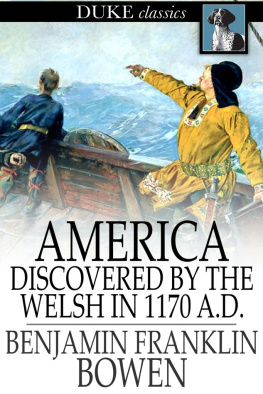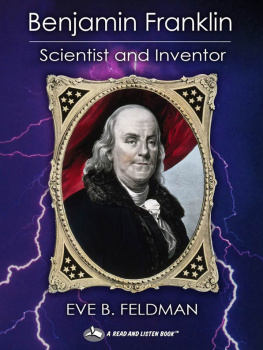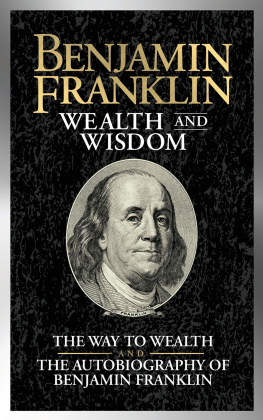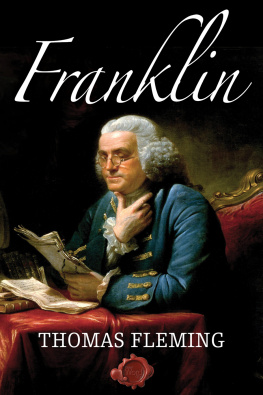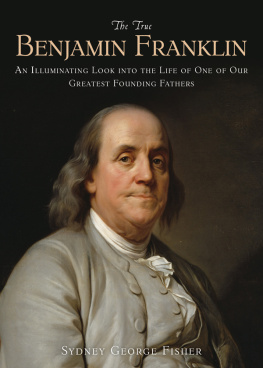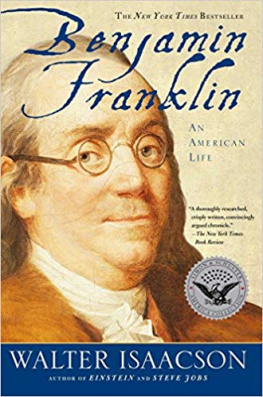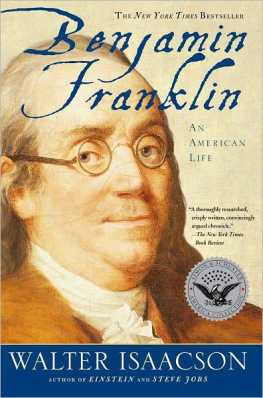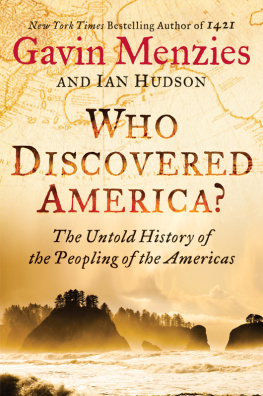AMERICA DISCOVERED BY THE WELSH IN 1170 A.D.
* * *
BENJAMIN FRANKLIN BOWEN
*
America Discovered by the Welsh in 1170 A.D.
First published in 1876
ISBN 978-1-62013-453-5
Duke Classics
2013 Duke Classics and its licensors. All rights reserved.
While every effort has been used to ensure the accuracy and reliability of the information contained in this edition, Duke Classics does not assume liability or responsibility for any errors or omissions in this book. Duke Classics does not accept responsibility for loss suffered as a result of reliance upon the accuracy or currency of information contained in this book.
Contents
*
*
Y Gwir yn erbyn y Byd.
"The Truth against the World."
Preface
*
Some time since, J. Sabin, the well-known book antiquarian of New York,related a very amusing story to me of a clergyman from Rhode Islandcoming into his store and inquiring whether he wished to purchase anIndian Bible. At once Mr. Sabin replied that he did, and that he wouldpay him five hundred dollars for it. The clergyman was delighted,returned to his home in Rhode Island, and, fearing to intrust so costlya relic to the express, determined to carry it himself to the city. Withgreat eagerness he opened the book in Mr. Sabin's presence, when thelatter, equally surprised and amused, exclaimed,
"Why, sir, that's not an Indian Bible!"
"Not an Indian Bible!"
"Why, no, sir!"
The clergyman at first thought the antiquarian was quizzing him, but,seeing him so serious, asked,
"Well, Mr. Sabin, what makes you think so?"
"Because it is a Welsh Bible."
The clergyman hastily picked up the volume and disappeared.
The two languages bear a marked resemblance to each other. In theclassification of the letters, the consonants in particular, includingthe gutturals, palatals, dentals, and labials, with their forms andmutations, hold such an identity in sound that any person not familiarwith either language might take them to be the same, while he whounderstood both would as readily allow that in many respects they wereakin.
The following pages are the result of an earnest desire to settle thequestion of, and, if possible, to fix the belief in, the voyages ofPrince Madoc and his followers in 1170 A.D., and to assign them theirrightful place in American history. Although this recognition has beenvery tardily given, by the almost utter silence of our historians, andthe apparent unconcern of those linked with the Prince by blood,language, and country, the honor will be none the less real if bestowednow. Indeed, in this age of claims, and when every scrap of our generaland local history is eagerly sought and read, it cannot be otherwisethan that what is set forth in his favor will receive some share ofattention from an intelligent public. Besides, so much earnest study hasbeen given by those in other countries to the subject of the earlydiscoveries on the American Continent, that it is hoped thiscontribution to its literature will serve to foster still further thespirit of inquiry, and be at the same time an acknowledgment of our debtto those countries for what they have furnished us in brain, heart,muscle, and life.
At intervals extending through several years, when released from thepressure of my public work, I have been engaged in the collection of thematerials, both at home and abroad, from old manuscripts, books,pamphlets, magazines, and papers. The subject was not common, neitherwere the materials. What are the facts? That is the question. Facts ofhistory, experience, observation. Speculative verbiage is avoided, forwant of time and space. Others are made to take my place, for the sakeof presenting what they knew. Such a method is more convincing thanthe expression of empty opinions.
B. F. B.
Chapter I - The Migrations of the Welsh
*
The etymology of the names of persons, places, and things is a curioussubject of inquiry. It is one of the safest guides in an attempt todistinguish the race-differences of a people whose history reaches backto an immemorial era.
The names of Wales and the Welsh are comparatively of recent origin.The Welsh have always called themselves Cymru or Cymry,Romanized intoCambria or Cambrians. This has been the generic name of the race as farback as any trace can be found of their existence. The Romans changedGal into Gaul; the Welsh sound u as e: hence they pronounced theRomanized word Gaul as Gael. The Saxons, as was their wont, substitutedw for g: hence, as the people of Cambria were esteemed to beanalogous to the Gauls, they called their country Waels or Wales, andits people Waelsh or Welsh; and these names have continued to thepresent time. But this people always have called themselves "Y Cymry,"of which the strictly literal meaning is aborigines. They call theirlanguage "Y Cymraeg,"the primitive tongue. Celt, meaning a covert orshelter, and Gaul, meaning an open plain or country, are terms appliedto various subdivisions by which the Cymric race have been known. Inthis connection it may be appropriate to say that the word "Indian" isone that does not apply or belong to the red race of the AmericanContinent, but was used by Columbus, who, anxious to discover the EastIndies by a northwest route, imagined that he had reached that country,and called the inhabitants Indians. Subsequent events have proved hismistake. The primitive races of this continent are more properlydesignated by the word aborigines, as in the case of the Cymry.
Through the rich and copious language and literature of Wales, thestudent of history is able to gather a vast store of knowledgerespecting its inhabitants and their early ancestors. The substantialresult arrived at as to their origin and migrations may be brieflystated as follows:
First. That the inhabitants of Wales, known to Homer as the Cimmerii,migrated thither from the great fountain-head of nations,the land ofthe Euphrates and Tigris.
Second. That they went in successive bands, each in a more advancedstate of civilization than the former.
Third. That they carried with them a peculiar language, peculiar artsand superstitions, marking their settlement on the Island of Britain ata very early period.
Fourth. That their journey through Europe is marked with the vestiges oftumuli, mounds, skulls, rude utensils, ornaments, and geographical namesin their language.
The Welsh language is of a pure radical construction, and remarkablyfree from admixture with other tongues. It is as copious, flexible, andrefined as it was two thousand years ago, when it existed alongside theGreek and Latin, both of which it antedates and survives, for it is not,like them, a dead language, but is in living use at the present day inliterature, commerce, home, and worship.
"'Dim Saesenaig! Dim Saesenaig!'" exclaimed the astonished ThomasCarlyle, when visiting the vale of Glamorgan, "'Dim Saesenaig!' (NoEnglish! No English!) from every dyke-side and house comes. The firstthing these poor bodies have to do is to learn English."
Thomas Carlyle was greatly mistaken, if he ever believed that the Welshwould tamely surrender their Cymraeg. It has been the symbol of theirunconquerable hope, and they watch with jealous care any inroads madeupon it. Upon the principle that might is right, nations have beenforced from their own soil, but with a most passionate tenacity theyhave still clung to their native tongue. True, there have been languageswhich have become extinct, like the nations which have spoken them, byconquest; but the Welsh continues to exist, because either the peoplewho speak it have never been conquered, or it has proved itself superiorto conquest.

